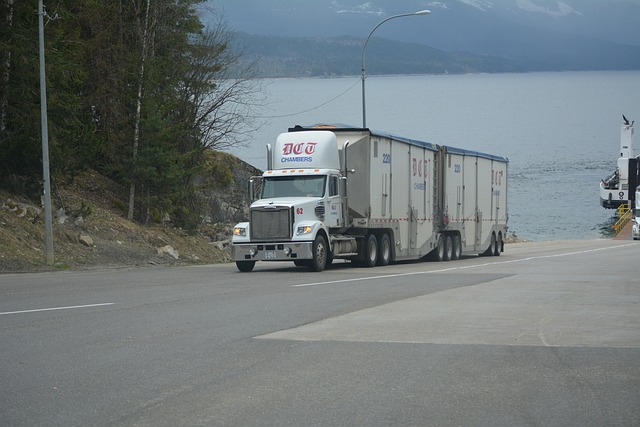Trucker violations, from safety protocols to cargo securing, carry severe consequences including penalties, legal repercussions, and disruptions in the industry for both drivers and companies. Non-compliance faces strict enforcement with varying penalties from warnings to license suspensions and criminal charges. Regulatory bodies play a crucial role in upholding compliance standards, ensuring road safety and environmental protection through inspections and fines. Non-adherence can lead to significant financial losses, legal disputes, and damaged customer trust for trucking businesses. Proactive measures like regular training and audits can mitigate risks and avoid costly penalties.
In the tightly regulated trucking industry, non-compliance with rules and regulations can lead to severe penalties for truckers and their companies. This article delves into the consequences of violations, exploring legal repercussions like fines and sanctions enforced by regulatory bodies. We analyze the impact on businesses, from operational costs to reputational damage, and offer strategies for trucking companies to ensure compliance and avoid harsh penalties. Understanding these dynamics is crucial for navigating the complex landscape of truck regulations.
- Understanding Non-Compliance: What Happens When Truckers Violate Regulations?
- Legal Consequences: Fines and Penalties for Out-of-Compliance Trucks
- Regulatory Bodies and Their Roles in Enforcing Compliance Standards
- The Impact on Businesses: Costs Beyond Penalties for Non-Compliant Truck Operations
- Strategies for Compliance: How Trucking Companies Can Avoid Severe Penalties
Understanding Non-Compliance: What Happens When Truckers Violate Regulations?

When truckers violate regulations, it’s crucial to understand the implications, as non-compliance can lead to significant penalties and disruptions in the trucking industry. These violations cover a wide range of issues, from safety protocols and vehicle maintenance to hours of service and cargo securing. Each infraction is carefully documented and reviewed by regulatory bodies, ensuring accountability.
The consequences for non-compliance vary depending on the severity of the violation. Minor infractions may result in warnings or fines, while more serious offenses can lead to license suspensions, vehicle impoundment, and even criminal charges. Trucking companies are also held responsible for their drivers’ actions, facing potential legal repercussions and financial losses if found guilty of systemic non-compliance. This strict enforcement aims to maintain high safety standards and uphold the integrity of the trucking sector.
Legal Consequences: Fines and Penalties for Out-of-Compliance Trucks

When trucks fail to comply with regulatory standards, they face a range of legal consequences. Fines are a common penalty, often imposed for violations related to safety, environmental, or traffic regulations. These penalties can vary significantly depending on the nature and severity of the non-compliance. For instance, a truck found to be operating without proper licensing or insurance may be subject to substantial fines and potential impoundment.
Moreover, repeated or willful non-compliance can lead to more severe penalties, including vehicle seizures, driver’s license suspensions, and even criminal charges in certain cases. Regulators may also require trucks to undergo thorough inspections and maintenance to bring them into compliance, ensuring road safety and environmental protection. These legal consequences serve as deterrents, encouraging truck operators to adhere strictly to established rules and regulations.
Regulatory Bodies and Their Roles in Enforcing Compliance Standards

Regulatory bodies play a pivotal role in ensuring compliance standards across various industries, including the trucking sector. These organizations are tasked with establishing and enforcing rules that govern businesses and their operations to protect consumers, workers, and the environment. In the case of trucks and transportation, regulatory bodies monitor adherence to safety regulations, vehicle maintenance standards, driver licensing requirements, and environmental protection measures.
For instance, in many countries, specialized government agencies oversee commercial trucking activities. These agencies conduct regular inspections of trucks, review maintenance records, and check for proper licensing and insurance coverage. Non-compliance with their guidelines can lead to severe penalties, including fines, license suspensions, or even legal actions. By holding truck companies and drivers accountable, these regulatory bodies contribute to maintaining a safe and efficient transportation network.
The Impact on Businesses: Costs Beyond Penalties for Non-Compliant Truck Operations

Non-compliance in truck operations can have significant repercussions, often extending far beyond the penalties themselves. Businesses involved in trucking face a myriad of costs when their operations veer off course from regulatory compliance. These include direct financial losses due to fines and legal fees, as well as indirect expenses related to reputational damage and loss of customer trust.
The impact is multifaceted. First, there’s the immediate cost of paying penalties, which can vary widely depending on the nature and severity of non-compliance. Additionally, businesses may face delayed deliveries, disruption in supply chains, and increased insurance premiums, all of which contribute to a strain on financial resources. Moreover, the potential for legal disputes and customer complaints can lead to lengthy and costly battles, undermining the stability and growth prospects of trucking operations.
Strategies for Compliance: How Trucking Companies Can Avoid Severe Penalties

Trucking companies can employ several strategies to ensure compliance and avoid severe penalties. Firstly, staying updated with regulations is paramount; this includes regular reviews of safety standards, licensing requirements, and weight restrictions specific to the industry. By keeping a step ahead, companies can proactively implement necessary changes to their operations.
Additionally, investing in training programs for employees can significantly reduce non-compliance risks. Educating drivers and staff about the latest rules and best practices ensures everyone understands their roles and responsibilities. Regular audits and self-assessments of operational procedures are also effective methods to identify potential gaps before they lead to penalties. These proactive measures not only help avoid fines but contribute to safer and more efficient trucking operations.
Trucking companies must navigate a complex web of regulations to ensure their operations comply with legal standards. Non-compliance can lead to severe penalties, impacting not just individual truckers but also businesses and their bottom lines. Understanding these consequences, recognizing the roles of regulatory bodies, and adopting effective compliance strategies are essential steps in minimizing risks associated with trucks. By adhering to regulations, trucking companies can foster a safe and efficient transportation network while avoiding costly legal repercussions.
